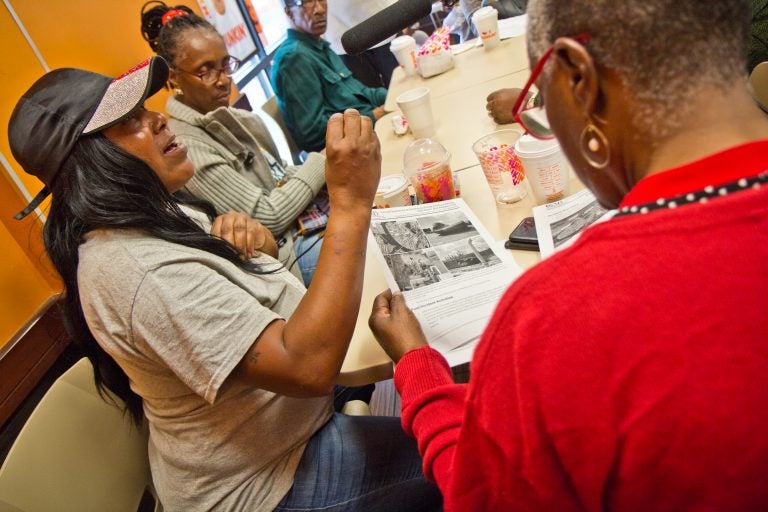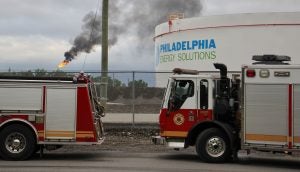Investigation in hand, South Philly residents blame refinery for putting their lives in jeopardy
After learning the results of the Chemical Safety Board investigation into the June 21 fire, many blame the refinery for putting their lives in jeopardy.
Listen 1:48
Sonya Sanders, (left), who lives near the Philadelphia Energy Solutions complex in South Philadelphia, reads the Chemical Safety Board's report on the refinery fire. (Kimberly Paynter/WHYY)
None of the three explosions that started a massive fire at the Philadelphia Energy Solutions complex at 4 a.m. June 21 woke Lindsey Shawver, a 26-year-old Girard Estates resident whose house is less than two miles from the refinery.
A report released Wednesday by the Chemical Safety and Hazard Investigation Board says highly toxic gas was released into the atmosphere during the incident. The explosions also hurled a piece of a 38,000-pound tank across the Schuylkill River. The investigation blames a faulty, old pipe that went uninspected.
“Sounds pretty awful,” said Shawver, adding that she was aware of the risk of living so close to the refinery. “It’s really scary.”
Sixty-one-year-old Rodney Everett said nothing in the report surprised him. He’s been living next to the refinery for most of his life and said he has seen the health effects on his neighbors as a member of the group Philly Thrive.
“This situation, it’s been a bomb waiting to set off for the last, who knows, 40 years,” Everett said. “But people are dying, people have died, and they have been dying for years. And there’s no reaction from the city, there’s no reaction from the people who run the company — all they care is about what kind of bucks they can bring in.”
Still, some local residents were shocked to hear that a corroded pipe could have taken their lives. The failed elbow was 0.012 inch thin when it ruptured. The company’s standards say such a pipe should be replaced if it wears down to 0.180 inch, according to the investigation.
“They should have known that that piece was faulty. When they do inspections every year, they should have checked, they should have said, ‘Look, this metal is thin, we have to make it thicker.’ They put our lives in jeopardy,” said Carol Fay, a 67-year-old neighbor of the refinery and a Philly Thrive activist.
Activists worry about the confirmed releases of hydrocarbons and hydrofluoric acid, one of the deadliest industrial chemicals in use. According to the Chemical Safety Board’s report, PES estimated that 5,239 pounds of HF were released during the incident and that only 1,968 pounds were contained by water spray within the refinery. The rest was released into the atmosphere.
“I want to know, as a resident in this community: What effect does that have on me?” asked Carol Hemingway, 70, who lives right next to the complex. “Am I going to get sick tomorrow? Am I going to be worse? I had cancer. You know, is it going to come back?”
The report says that only five workers experienced minor injuries during the accident and that the Chemical Safety Board “is unaware of any offsite or onsite health impacts from the hydrofluoric acid release.”
Sonya Sanders of Philly Thrive said that’s because nobody investigated.
“I live in this community, I was asked no questions. They live in this community, they were asked no questions. No one told me to go to the doctor and see if anything affected my health,” she said.
Sanders said she was also surprised to learn about three fragments of a tank flying off with the explosion.
“That could have smashed one of our houses, killed the whole family,” she said.
Alex Clowes was an operator at the refinery for 29 years. After being laid off by PES, he got a job at another refinery in Trainer, Delaware County. Clowes said it’s surprising to hear a faulty pipe caused the explosion.
“Everybody was always saying the refinery is old, the refinery is old. Well, the footprint is old, it has been there for a while, but all those pipes have been replaced many times over the years,” he said.
As to why the faulty elbow was not inspected, he said he couldn’t comment.
“I can’t imagine an elbow wouldn’t be inspected in 45 years,” said Robert Campbell, who worked at the refinery for 20 years and now is getting training to work as a truck driver. “Those guys are thorough, their lives depend on that stuff.”
Campbell said he couldn’t comment on whether the company was shortsighted given the conclusions in the preliminary safety board report. He said he hopes the final report clarifies what happened.
“I know my direct supervisors cared about me, and that I cared about them. It’s hard to explain to a normal human being, but in a refinery … they really are your family. Nobody would put their family at risk, nobody would consciously do that. That’s my opinion,” Campbell said.
Both the workers and the neighbors said they owed their lives to Barbara McHugh, the refinery operator who quickly moved to prevent more gas from being released.
Shawver, the heavy sleeper at Girard Estates, said she is really grateful that McHugh reacted in less than 30 seconds. She’s not sure everyone would be able to act that quickly.
“I guess that’s the scariest part,” she said. ”There should definitely be more precaution so we don’t have to rely on one single person to be able to do that.”
WHYY is your source for fact-based, in-depth journalism and information. As a nonprofit organization, we rely on financial support from readers like you. Please give today.






